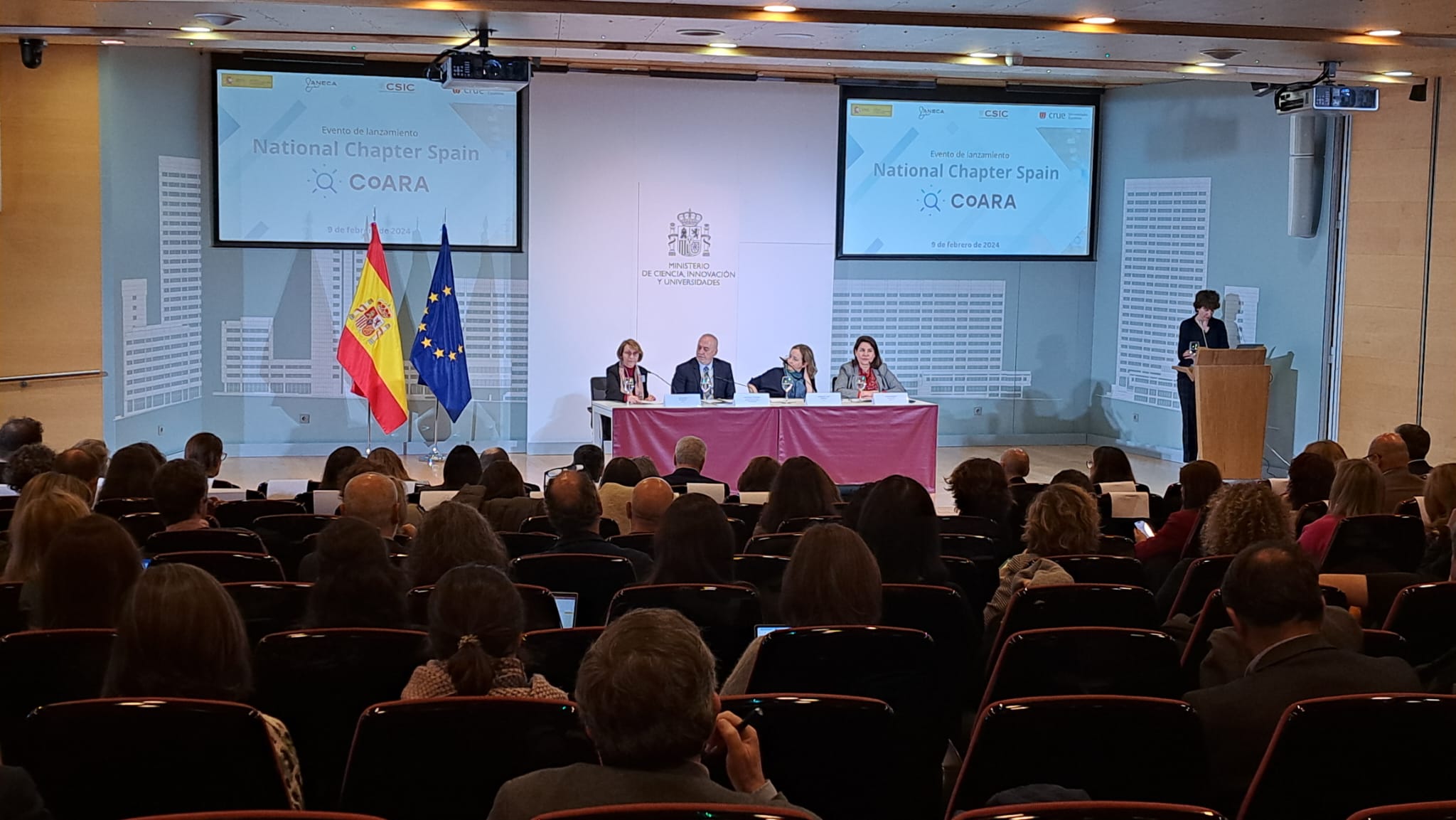Updated on 09 January 2025
The presentation of the National Chapter Spain took place at the Ministry of Science, Innovation, and Universities on February 9, 2024. This National Chapter is led by four institutions: ANECA, an evaluation agency; CRUE, which represents Spanish universities; ISCII, Spain’s leading public research institution; and CSIC, the main institution representing the national research centers. Juan Cruz Cigudosa, Secretary of State for Science, Innovation, and Universities, inaugurated the event. He mentioned open science as a lever for change to democratize and accelerate the dissemination of knowledge to all corners of society, ensuring it serves as an actual driver of economic progress and social well-being.
Eva Alcón, President of CRUE and Rector of the Universitat Jaume I, stated that the project is another commitment to continuous improvement and emphasized the need to rethink the evaluation of research activity from a more qualitative and holistic perspective to address societal challenges. Eloisa del Pino, President of CSIC, remarked that we are transitioning into the paradigm of science evaluation. CSIC wants to be part of it and contribute to its definition. Transition moments are not easy, but how researchers are assessed will determine how research will progress.
The National Chapter aims to create a joint initiative that promotes and supports the review and development of criteria, tools, and research evaluation procedures in Spain through a co-creation process involving representatives from research centers, quality agencies, and universities. Now, 84 Spanish institutions are participating in this national initiative: 12 quality agencies, 11 research centers, one research funding organization, two associations, and 58 universities. Additionally, it seeks to create a space for learning and collaboration with other National Chapters and working groups of the Coalition for the Advancement of Research Assessment (CoARA) in Europe.
During the event, the European and national contexts, objectives, and lines of work were analyzed. Various institutional experiences related to evaluation criteria and methodologies, awareness, training, and multidisciplinary and interdisciplinarity were also shared. The working session began with the presentation of the National Chapter Spain: European and National Context, objectives, and Lines of Work delivered by Senena Corbalán, CRUE representative for CoARA and Vice-Rector of Research at the University of Murcia. The first roundtable was moderated by Pilar Paneque, director of ANECA. They discussed Institutional experiences for research evaluation reform in Spain: Assessment criteria and methodologies, with contributions from Ángel M. Delgado Vázquez at Pablo de Olavide University, Olatz Arrizabalaga Garde at the Biogipuzkoa Health Research Institute, and Giulia Pollarolo at the Barcelona Institute for Global Health (ISGlobal). Among other issues, the importance of developing tools to advance toward a more automated evaluation process and developing optimal indicators aligned with these tools was highlighted. The following roundtable was moderated by José Miguel García, CRUE representative executive committee and vice-rector for Research & Innovation at the University of Burgos. They addressed Institutional experiences for the research evaluation reform in Spain: Awareness and training, with presentations by Pastora Martínez Samper at the Open University of Catalonia, Núria Benítez Monforte at ICN2, and Teresa Sanchís Estruch at the Institute of Bioengineering of Catalonia (IBEC).
The event concluded with the roundtable moderated by Elena Dominguez, CSIC representative at Brussels and it was about Institutional Experiences for Research Evaluation Reform in Spain: Addressing multi- and interdisciplinarity, featuring Manuel González Bedia from the Ministry of Digital Transformation and Public Function and Jordi Molas Gallart from CSIC. The discussion revolved around the difficulty in Spain of evaluating interdisciplinary careers and the need for a project like CoARA that addresses the diversity of academic profiles that exist today. Throughout the day, attendees actively participated, sharing their experiences as evaluators and evaluated persons through question-and-answer sessions. It became a space for dialogue and exchanging ideas, a promising starting point for a necessary project.
The general secretary for Universities, José Manuel Pingarrón closed the session, remarking on the importance of reforming the whole research and innovation system in Spain. He acknowledged the enormous number of institutions joining the National chapter and recognized the difficulties in developing impact indicators. He congratulated ANECA for the tremendous effort in including DORA and CoARA principles in their research evaluation. He called our attention to work now, little by little, to move forward on a safe path that will allow the Spanish system to address this reform so that it will boost research and knowledge transfer while preserving the careers already started under the old system.



